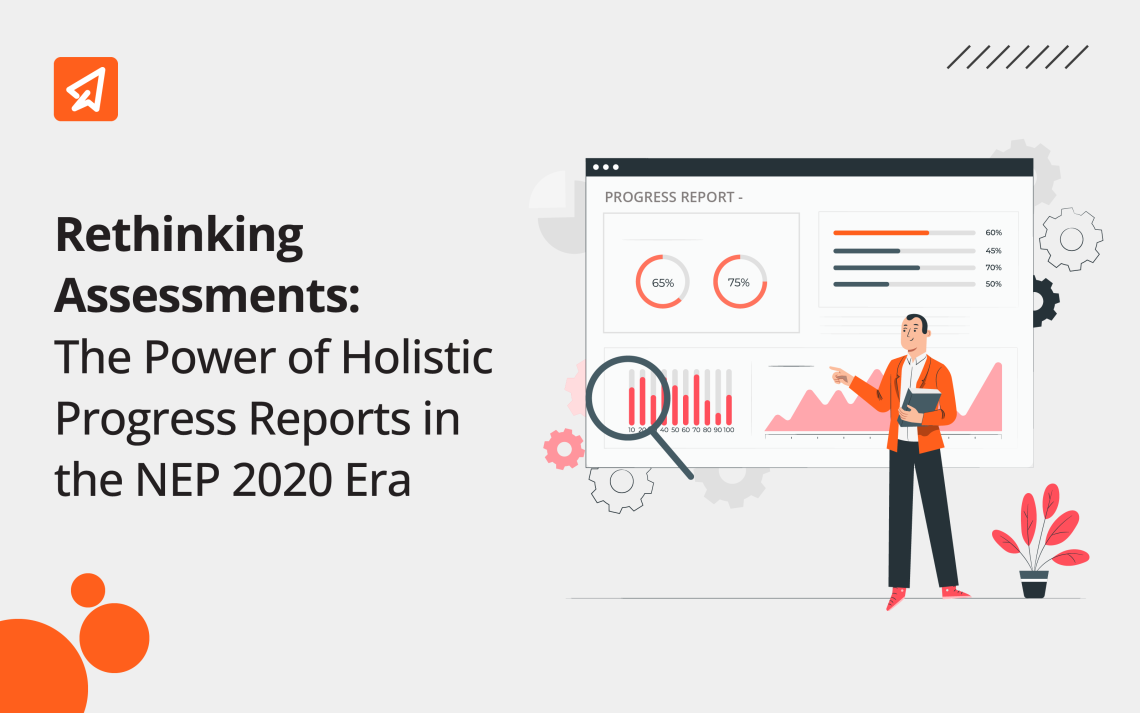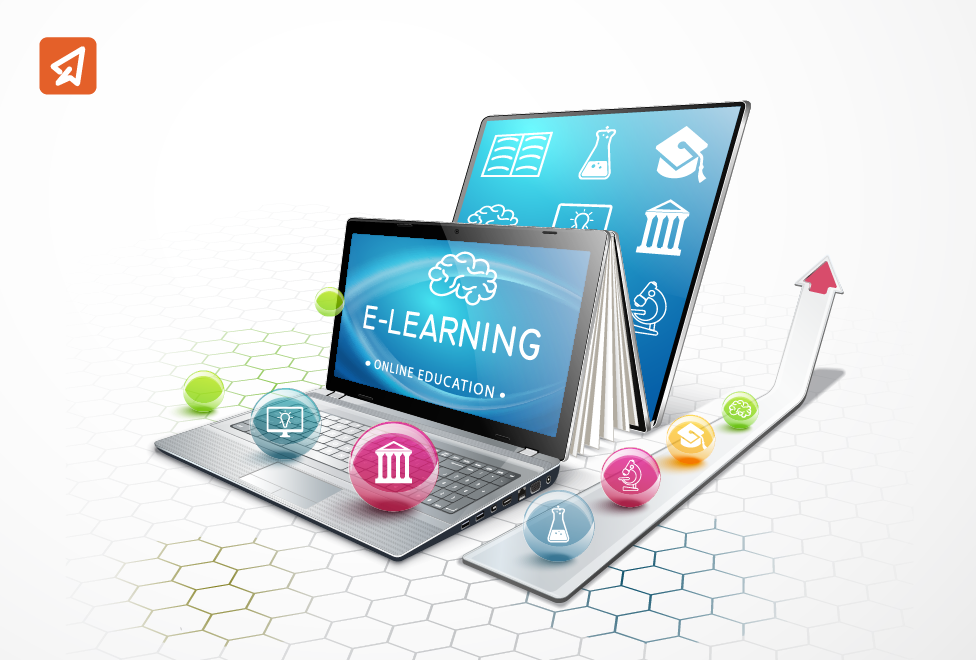What is the Holistic Progress Card by NCERT?

As per the National Education Policy 2020 (NEP 2020) guidelines, student assessment, and progress tracking need to undergo a significant transformation. One of the key recommendations of NEP 2020 is the adoption of a holistic report card, which aims to provide a comprehensive evaluation of a student’s overall development.
The Holistic Progress Card (HPC) from NCERT is a fresh way to assess students. Unlike the usual grading methods that mainly look at academic scores, the HPC takes a broader view of a student’s growth. It checks not just how well a student does in subjects but also looks at their cognitive skills, social and emotional development, physical abilities, and even their values and attitudes.
By focusing on these different areas, the HPC gives a clearer and more complete picture of how a student is progressing overall. Let’s dive into the article and take an in-depth look at how HPC works.
What is the Main Objective of HPC?
The primary objective of the Holistic Progress Card (HPC) is to map the learning status of each child, specifically in foundational literacy and numeracy skills. The HPC emphasizes the uniqueness of every learner, capturing their individual growth and progress over time. The HPC serves as valuable documentation of a child’s self-expression and the teacher’s assessment based on their competencies. Additionally, it acts as a vital link between home and school, involving parents as integral partners in their child’s learning journey.
What are the Features of HPC?
The Holistic Progress Card (HPC) has a range of features. These include:
1. Participatory, inclusive, and learner-centric approach
2. Integration of self-assessment, peer assessment, and parent feedback
3. Assessment through project-based and inquiry-based learning, quizzes, role plays, group work, portfolios, etc.
4. Definition of explicit learning outcomes as pathways for competency acquisition
5. A progressive approach to developing skills among children
6. Promotion of self-awareness and self-esteem by communicating strengths and areas of improvement
7. Provision of space for children to learn at their own pace
8. Based on three developmental goals: health and well-being, effective communicators, involved learners
Aspects of a Holistic Report Card
A Holistic Report Card encompasses several key aspects that shape its effectiveness in assessing student progress. These aspects include:
1. Equitable
A holistic report card ensures fairness and the elimination of prejudice from the evaluation process. It provides an unbiased evaluation that takes into account each student’s unique capabilities and potential.
2. Inclusive
The report card embraces inclusivity by considering diverse learning styles, abilities, and interests. It acknowledges the individual strengths and challenges of students, fostering an inclusive learning environment that supports their overall growth and development.
3. Joyful
A holistic report card promotes a positive and joyful learning experience. It recognizes the significance of creating an engaging and enjoyable educational journey that motivates students to explore, discover, and excel.
4. Holistic
As the name suggests, a holistic report card takes into account multiple dimensions of a student’s progress. It goes beyond academic achievements and incorporates social, emotional, and physical development. This comprehensive approach provides a well-rounded assessment that considers the overall growth and well-being of each student.
5. Diverse Knowledge
A holistic report card values diverse forms of knowledge and recognizes that learning encompasses various subject areas, skills, and competencies. It appreciates the importance of nurturing a broad range of talents, including artistic, scientific, linguistic, and interpersonal abilities.
Key Considerations for Principals
The Principal has an important role in getting everyone on board with the idea of a Holistic Progress Card (HPC) at the school. This support is important for adopting a “Whole School” approach that emphasises the significance of competency-based assessments.
It’s vital for school management and all involved parties—like Principals, teachers (including Heads of Departments), administrators, coordinators, and parents—to understand competency-based assessment as part of the education reform aimed at enhancing schools’ ability to provide quality learning experiences.
Here are some important points for school principals to keep in mind:
- Logistical Support: Ensure that teachers have the necessary resources and support to implement the HPC, whether online or offline.
- Mentoring Teachers: Offer guidance and mentoring to teachers as they work with the HPC to help them feel more confident in their teaching.
- Parent Involvement: Create opportunities for parents to learn about and engage in their child’s overall development.
- Smooth Transitions: Facilitate an easy transition for children moving from Early Childhood Care and Education (ECCE) to Class 1.
- Accessibility: Keep an HPC for each child that is easy for parents to access and understand.
Role of Teachers
- Holistic Evaluation: Teachers have an important job in the Holistic Progress Card (HPC) system, where they assess students in many areas, not just academics. They look at how students think, feel, interact with others, and even their physical skills. This gives a fuller picture of a student’s growth beyond just grades.
- Encouraging Self-Assessment: Teachers help students learn to evaluate themselves. By guiding them in self-reflection, students become more aware of their own learning journeys, which makes them feel more responsible for their education.
- Using Peer Feedback: The HPC encourages teamwork and learning from one another. Teachers facilitate peer reviews, allowing students to give and receive feedback. This approach not only builds a sense of community but also helps students learn from their classmates’ perspectives.
- Creating Engaging Activities: Teachers design fun and inclusive activities where students can show what they know. Whether through projects, role plays, or group work, active participation is essential for meaningful assessments.
- Recognising Individual Needs: By observing how students work and play together, teachers can spot each student’s strengths and areas that need improvement. This understanding helps them offer tailored support to meet different learning needs.
- Fostering Emotional and Social Skills: Teachers play an important role in helping students develop important social and emotional skills, such as empathy, teamwork, and communication. These skills are essential for students’ overall development.
- Involving Parents: The HPC encourages teachers to involve parents in the assessment process. By sharing insights about their child’s learning, teachers help create a support system that extends beyond the classroom.
- Ongoing Feedback: Instead of waiting until the end of a term to evaluate students, teachers provide regular feedback. This ongoing assessment allows them to monitor student progress over time, helping identify where more support might be needed.
- Setting Personal Goals: Teachers assist students in setting realistic goals based on their abilities. They guide them in achieving these goals through structured learning experiences, helping them grow at their own pace.
What the National Educational Policy 2020 Says About the Holistic Progress Report?
The National Educational Policy 2020 emphasizes a significant shift in the assessment culture of our schooling system. According to the policy, the aim of assessment will transform from being primarily summative and focused on rote memorization skills to a more regular and formative approach.
The holistic progress report, as envisioned in NEP 2020, will be a multidimensional reflection of each learner’s progress in the cognitive, affective, and psychomotor domains. It will encompass self-assessment, peer assessment, and various forms of project-based and inquiry-based learning, along with teacher assessment.
Additionally, it will provide teachers and parents with valuable insights to support each student in their learning journey. The NEP 2020 suggests the use of AI-based software to track student growth, enabling them to identify their strengths and areas of focus for making informed career choices.
Learn More about the National Education Policy (NEP) 2020
Explore the comprehensive guide to the National Education Policy 2020. Discover how it is implemented, NEP features, and principles.
Learn MoreWhat is a 360 Degree Holistic Report Card?
NEP 2020 recommends that regular report cards be redesigned and replaced by a holistic multidimensional progress card. The 360-degree holistic report card should contain a detailed analysis of a student’s cognitive, psychomotor, and socio-emotional domains. The current summative assessment-based system focuses primarily on testing rote memorization skills.
However, NEP 2020 promotes a shift to a more competency-based formative system. Under NEP 2020, the holistic rapport card has been designed to include self-assessment, peer assessments, and teacher assessments, reflecting a more comprehensive overview of various student learning and development aspects. It will consist of indicators like critical -thinking, problem-solving, collaboration, and other higher-order skills.
Reimagining Progress Reports as Per Nep 2020: Strategies for Effective Implementation
To effectively implement holistic progress reports, schools can leverage innovative solutions like the Extramarks Smart Class Plus platform. This comprehensive school solutions platform offers a real-time updated curriculum that is in line with NEP 2020 in addition to several features that support you in adopting holistic report cards. Extramarks Smart Class Plus provides tools for project-based learning, collaborative assessments, and personalized feedback, ensuring a seamless integration of the holistic assessment approach.
How Extramarks Partner Schools Are Already in Sync With NEP 2020 Exams & Assessment Reforms?
Extramarks Partner Schools have been at the forefront of embracing NEP 2020 reforms. With our NEP Ready Content feature, we ensure that teachers and students are well-prepared for upcoming changes. From updated syllabi to innovative teaching methods and cutting-edge technologies, our comprehensive education experience aligns with the NEP guidelines. We’re excited to witness the positive impact these reforms will have in the classroom, empowering both teachers and students on their learning journey. Together, let’s stay ahead of the curve and drive educational progress.
Conclusion
Holistic progress reports in line with NEP 2020 offer a comprehensive and individualized assessment, empowering educators to understand each student’s unique potential. Leveraging technology like Extramarks Smart Class Plus, schools can embrace this transformative approach, providing interactive content, personalized learning, and fostering holistic growth. Let’s reimagine education and unlock the full potential of every student for a brighter future. Explore Extramarks Smart Class Plus, today!
FAQs – Holistic Report Card
1. What is a holistic report card?
A holistic report card is a multidimensional assessment tool that provides a comprehensive overview of a student’s progress and development in various domains, including cognitive, affective, and psychomotor skills.
2. How does a holistic report card benefit students?
A holistic report card offers a more accurate representation of a student’s abilities and growth, providing a deeper understanding of their overall development. It encourages a student-centric approach, focusing on their individual strengths, interests, and learning needs.
3. How does the NEP 2020 influence the concept of holistic report cards?
The NEP 2020 emphasizes the shift from a rote memorization-based assessment system to one that is more competency-based, formative and focused on higher-order skills. Holistic report cards align with the objectives of NEP 2020 by promoting a comprehensive evaluation of a student’s learning outcomes.
4. How can Extramarks Smart Class Plus support the implementation of holistic report cards?
Extramarks Smart Class Plus offers a range of features to support the implementation of holistic report cards. It provides interactive digital content, personalized learning journeys, and assessments aligned with NEP 2020. The platform enables teachers to track student progress across various dimensions, conduct self-assessments, and facilitate peer assessments. With its advanced analytics and reporting tools, educators can generate holistic progress reports easily.
5. How can schools and educators adopt holistic report cards?
To adopt holistic report cards, schools and educators can begin by aligning their assessment practices with the principles of NEP 2020. They can incorporate diverse assessment methods, such as project-based learning, portfolios, group work, and self-assessment.
Last Updated on November 11, 2024
Reviewed by

Prachi Singh | VP - Academics
Prachi Singh is a highly accomplished educationist with over 16 years of experience in the EdTech industry. Currently, she plays a pivotal role at Extramarks, leading content strategy and curriculum development initiatives that shape the future of education...read more.










